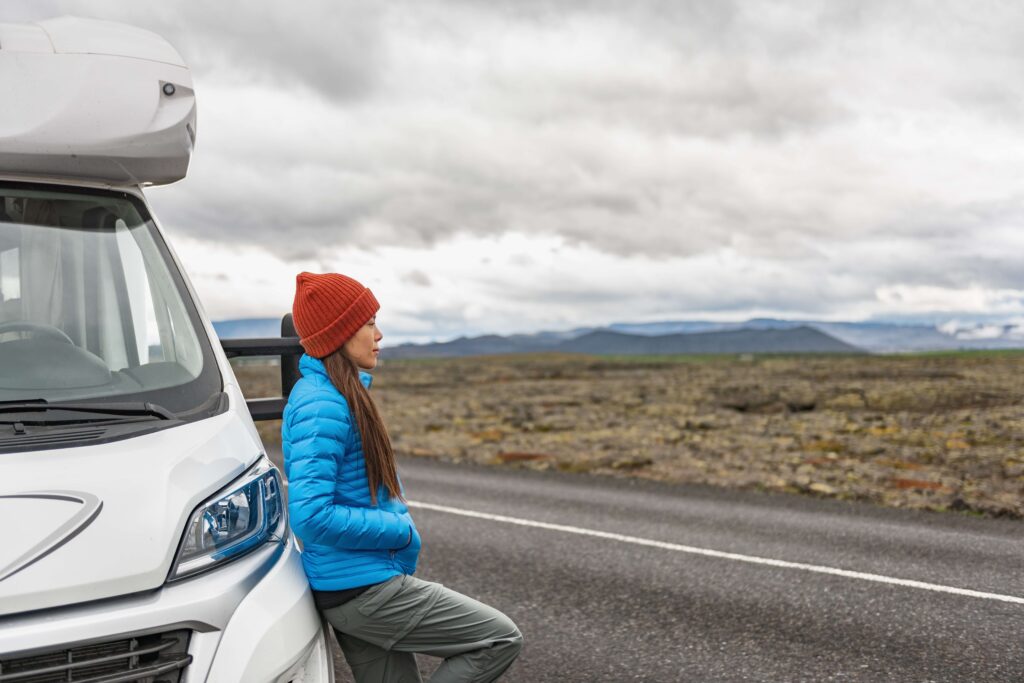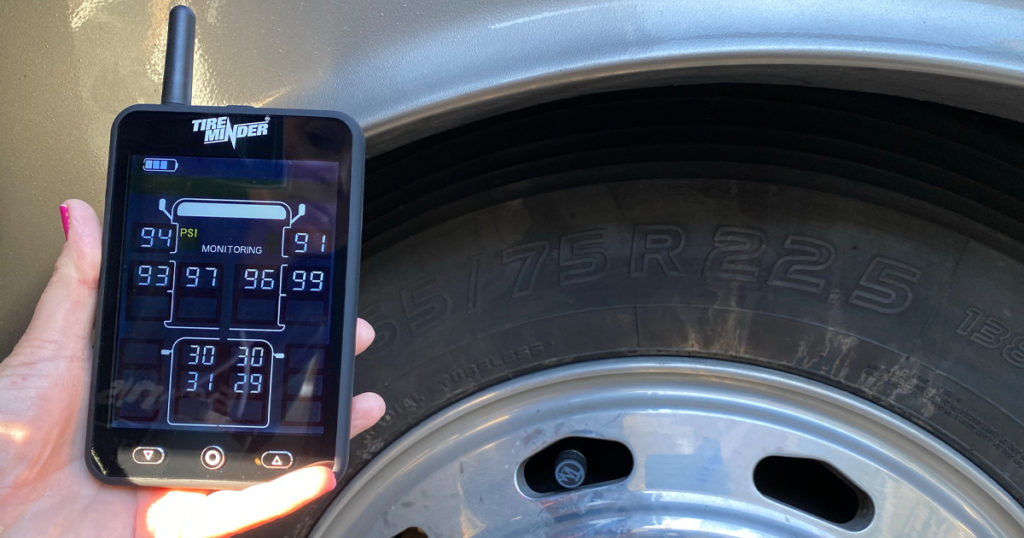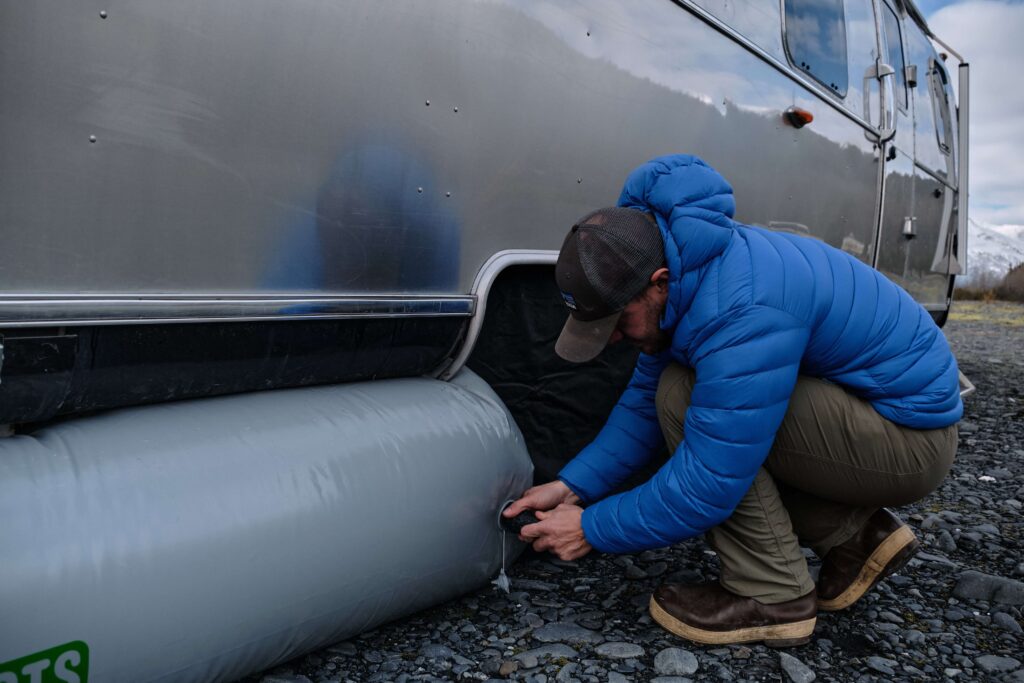When the seasons change, full-time RVers have a couple of options. Head south for warmer weather, winterize the RV, and put it into storage, OR brave the cold weather and keep on camping! In this article, we’re going to talk about seven common mistakes that many new RVers often overlook when cold weather camping. Winter RV adventures can be incredible, but they also come with unique challenges you NEED to know about. So, keep reading to make your winter RV & camping trips safe and comfortable!

Underestimating the Importance of Insulation
Many RVs are not well-insulated for extreme cold. Even RVs that are labeled as “4 seasons” are not insulated for freezing temps. RVs still need some extra care in the insulation department. Remember RV’s are built to be lightweight which means the walls are thin and not well insulated. Adding extra insulation like reflectix in cabinet areas and using things like window film to help insulate windows, is crucial so you do not have a chilly and uncomfortable interior.
Not Preparing the RV Plumbing System
When water freezes at low temperatures, this can wreak havoc on your RV’s plumbing system. Not only do you NOT want to find yourself in a situation where you have no water flow, but frozen RV pipes can mean replacing the pex tubing that is used in RV water systems.
This is where using heated hoses not only for water but also using a heated sewer hose or a heated sewer hose support can be helpful. If you are going to put your RV into storage, be sure to properly winterize plumbing by draining water tanks and using RV antifreeze, to prevent freezing and costly damage. We will talk about another item that can help keep your RV water system from freezing in cold temps a little later.
Neglecting Maintenance items
Cold weather can affect tire pressure, making it crucial to regularly check and maintain your RV’s tires. Under-inflated tires can lead to poor handling and even blowouts, which can be dangerous on wintry roads. If you are using lithium batteries, they will not perform well in extreme cold temps. This is where using a heated battery pad can be helpful. Also be sure to check seals and weather stripping especially around slide-outs, doors, and windows.
No products found.

Insufficient Heating Planning
Relying solely on the RV’s built-in furnace may not be sufficient in extremely cold conditions. New RVers often fail to bring backup heating sources like space heaters or heated blankets, which can provide extra warmth and comfort. Remember that safety should always be a top priority when using any heating source in your RV. Ensure proper ventilation, check for carbon monoxide leaks, and follow manufacturer instructions and safety guidelines. It’s also a good idea to have multiple backup heating sources in case one fails or if you run out of fuel.
Forgetting About Condensation When Cold Weather Camping
Temperature Differential between the inside air temperature of your RV and the outside ambient temp in cold weather in addition to humidity levels and poor ventilation causes a lot of condensation in RVs. Failing to address condensation can result in mold and mildew growth. Using extra ventilation like roof vent fans, dehumidifiers, and moisture-absorbing products can help to combat this issue. Check out this video for more info about mitigating condensation.
- DON’T JUST COVER UP ODORS, ELIMINATE THEM: DampRid Fresh Scent Hanging Moisture Absorbers attract and trap excess moisture from the air, eliminating musty odors and creating fresher, cleaner air.
- 14% MORE MOISTURE ABSORBING POWER*. You can see DampRid work as it attracts and traps excess moisture. 3 Pack of 16-ounce bags.
- LONG-LASTING FRESHNESS: DampRid hanging bag moisture absorbers can last up to 60 days depending on temperature and humidity. Ideal for use in closets to protect your clothes and leather goods from musty odors and moisture damage.
Not skirting the RV
RV skirting in cold weather is crucial for several reasons. Skirting refers to the process of enclosing the underside of your RV with a material that acts as a barrier between the RV and the cold ground. Here’s why RV skirting is essential in cold weather:
- Improved Insulation: RVs are typically not well-insulated underneath, and they often have gaps and openings where cold air can infiltrate. Skirting creates a sealed barrier that helps to keep the cold air out and the warm air inside. This significantly improves the overall insulation of your RV, making it easier to maintain a comfortable temperature Skirting can also help with things like
- Protection Against Frozen Pipes. We personally like airskirts for ease of installation and portability. They take up very little space to store when not in use. They simply inflate, you can place them around your RV and then deflate them when you are ready to take them down. And since no RV is a one-size-fits-all, air skirts can help ensure you don’t have any large gaps as you are insulating with them.

Poor Trip Planning
Ok, seriously people – unless you want a ski vacation or need to be near family, HEAD SOUTH! Your RV has wheels for a reason! But if you can’t head south, make sure to double-check that the campground you are considering is even open. Many campgrounds in cold weather states actually winterize their sites and CLOSE for the season. Make sure you are not left out in the cold (see what I did there?). Make those phone calls to be sure you have a place to set up camp.
Happy cold weather camping!


RV friendly….
RV’z with basement storage
get cold floors ….
Stuff with foam cushions.
Lay cushions flat on storage floor & vertical
at each storage door….
Also easy to stow away in one storage bin….
Comfortable Now….😊